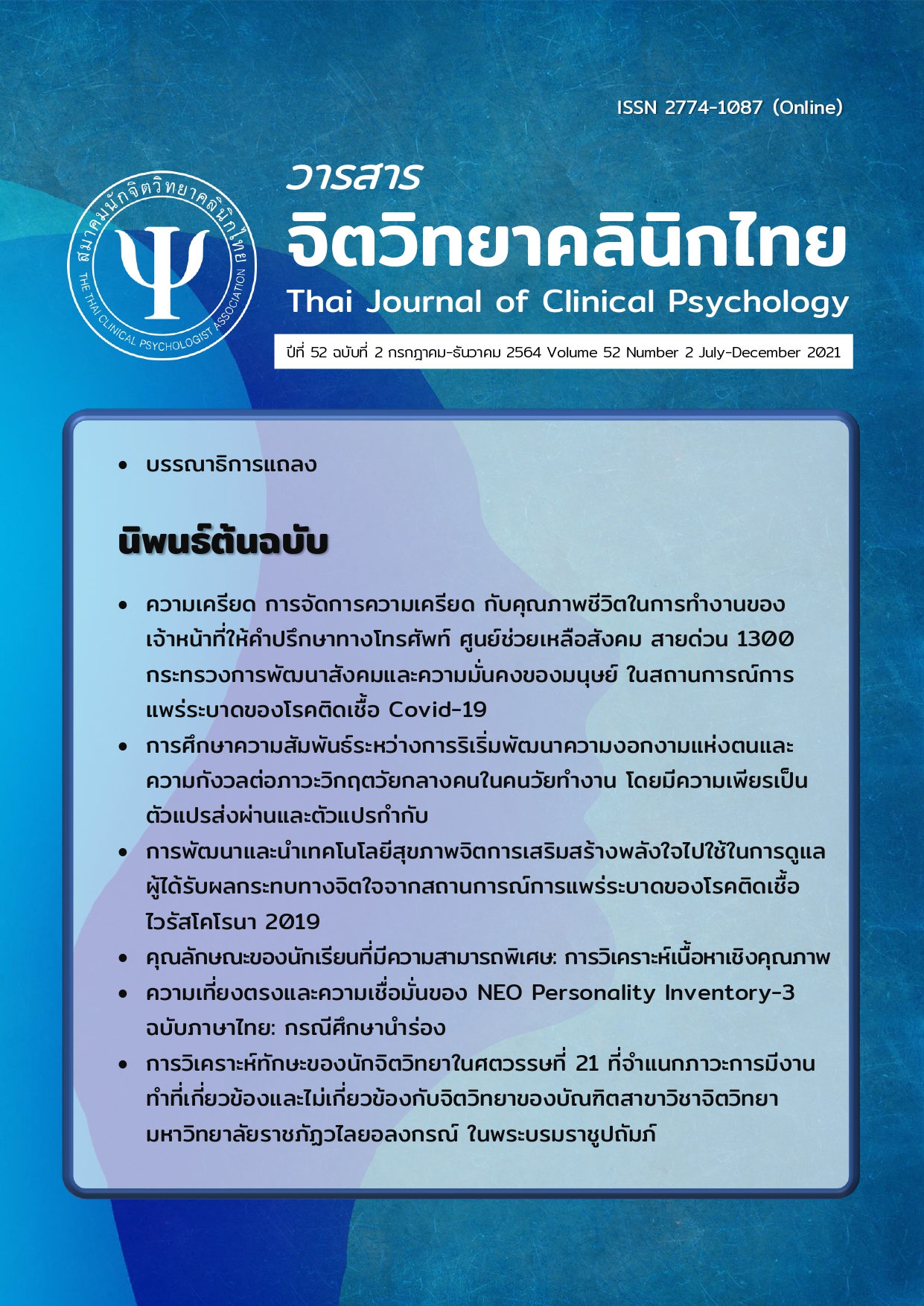การศึกษาความสัมพันธ์ระหว่างการริเริ่มพัฒนาความงอกงามแห่งตนและความกังวลต่อภาวะวิกฤตวัยกลางคนในคนวัยทำงาน โดยมีความเพียรเป็นตัวแปรส่งผ่านและตัวแปรกำกับ
Main Article Content
บทคัดย่อ
วัตถุประสงค์ เพื่อทดสอบความสัมพันธ์ระหว่างการริเริ่มพัฒนาความงอกงามแห่งตน ความเพียร และความกังวลต่อภาวะวิกฤตวัยกลางคน และตรวจสอบความเพียรในฐานะตัวแปรส่งผ่านและตัวแปรกำกับในรูปแบบโมเดลความสัมพันธ์เชิงสาเหตุผ่านการวิเคราะห์เส้นทาง (path analysis)
วัสดุและวิธีการ การวิจัยครั้งนี้เป็นการวิจัยภาคตัดขวาง เก็บข้อมูลผ่านการตอบแบบสอบถาม ได้แก่ มาตรวัดการริเริ่มพัฒนาความงอกงามแห่งตน มาตรวัดความเพียร และมาตรวัดภาวะวิกฤตในช่วงเปลี่ยนผ่านวัยกลางคนกับบุคคลอายุ 40-60 ปีที่ยังคงทำงานอยู่ในกรุงเทพมหานคร จำนวน 319 คน วิเคราะห์ข้อมูลโดยการใช้สถิติเชิงพรรณนา การวิเคราะห์ค่าสหสัมพันธ์แบบเพียร์สันด้วยโปรแกรม SPSS การวิเคราะห์ตัวแปรส่งผ่านและตัวแปรกำกับผ่านโปรแกรมสำเร็จรูป PROCESS
ผลการศึกษา พบว่าทั้งสามตัวแปรมีความสัมพันธ์อยู่ในระดับต่ำค่อนปานกลาง ในการวิเคราะห์ตัวแปรส่งผ่านพบว่าความเพียรเป็นตัวแปรส่งผ่านแบบบางส่วน โดยร่วมกับการริเริ่มพัฒนาความงอกงามแห่งตนทำนายการลดลงของความกังวลช่วงวิกฤตวัยกลางคนได้ 26% แต่อย่างไรก็ตามไม่พบอิทธิพลของความเพียรในฐานะตัวแปรกำกับ กล่าวคือการทำนายความสัมพันธ์ระหว่างการริเริ่มพัฒนาความงอกงามแห่งตนและความกังวลต่อภาวะวิกฤตวัยกลางคนนั้นไม่ขึ้นอยู่กับความเพียร
สรุป ความเพียรสามารถเป็นตัวแปรส่งผ่านและอาจเป็นส่วนหนึ่งของกระบวนการริเริ่มพัฒนาความงอกงามแห่งตน ซึ่งช่วยเพิ่มประสิทธิภาพในการลดความกังวลส่วนบุคคลในคนทำงานวัยกลางคนเพื่อที่จะก้าวผ่านวิกฤตไปด้วยสุขภาพจิตที่ดีขึ้นด้วยการเสริมปัจจัยความเพียรผ่านการให้คำแนะนำหรือการเข้าอบรมผ่านการพัฒนากระบวนการริเริ่มความงอกงามภายในตนเอง
Article Details
เรื่องที่ลงตีพิมพ์ในวารสารจิตวิทยาคลินิกแล้วถือเป็นลิขสิทธิ์การเผยแพร่โดยวารสารจิตวิทยาคลินิกแต่เพียงผู้เดียว การตีพิมพ์หรือเผยแพร่ซ้ำในที่อื่นต้องได้รับอนุญาตจากกองบรรณาธิการวารสารฯ
เอกสารอ้างอิง
Arpanantikul, M. (2003). Midlife experiences of Thai women. Journal of Advanced Nursing. 47(1), 49-56.
Aguinis, H., Beaty, J. C., Boik, R. J., & Pierce, C. A. (2005). Effect size and power in assessing moderating effects of categorical variables using multiple regression: A 30-year review. Journal of Applied Psychology. 90(1), 94-107.doi:10.1037/0021-9010.90.1.94.
Baron, R. M. & Kenny, D. A. (1986). The moderator-mediator variable distinction in social psychological research: Conceptual, strategic, and statistical considerations. Journal of Personality and Social Psychology. 51(6), 1173-1182.
Ceschi, A., Sartori, R., Dickert, S., & Costantini, A. (2016). Grit or honesty-humility? New insights into the moderating role of personality between the health impairment process and counterproductive work behavior. Frontiers in Psychology. 7. DOI: 10.3389/fpsyg.2016.01799.
Chotitham, S. (2018). A casual model of achievement of Northern undergraduate students with grit as a mediator. JEDU NU. 20(4), 230-239. (In Thai).
Cole, A. B. (2018). An examination of grit as a moderator of the relationship between perceived discrimination and suicide Ideation. Unpublished doctoral dissertation, Oklahoma State University, Okalahoma, United States.
Duckworth, A. L., Peterson, C., Matthews, M.D., & Kelly, D.R. (2007). Grit: perseverance and passion for long-term goals. Journal of Personality and Social Psychology. 92(6), 1087-1101. DOI: 10.1037/0022-3514.92.6.1087.
Duckworth, A. L. (2017). Grit: why passion and resilience are the secrets to success. London: Vermillion, 270-321.
Dancey, C.P., Reidy, J. (2011). Statistics without maths for psychology fifth edition. Harlow: Prentice Hall, 176.
European Bank for Reconstruction and Development. (2016). Chapter 1:Life satisfaction in the transition region. Life in Transition Survey III. Retrieved from https://www.ebrd.com/documents/oce/ pdf- life- in- transition- iii- lifesatisfaction.pdf.
Hayes, A. F. (2013). Introduction to mediation, moderation, and conditional process analysis: a regression-based approach. New York: Gilford Press.
Jongjumruspan, B. (2016). The association between hope and flourish: the moderating roles of grit and stress. Unpublished master’s thesis, Chulalongkorn University, Bangkok, Thailand. (In Thai).
Kaewkangwan, S. (1991). Psychology of middle adulthood (1st ed.). Bangkok:Takieng. (In Thai).
Kaplan, P. S. (1998). The human odyssey: Life-span development (3rd ed.). Pacific Grove: Brooks/Cole.
Kim, Y. J. (2015). Study on the role of grit in Korean elderly suicide ideation. Advanced Science and Technology Letters. 91(2015), 67-70.
LaCava, A. (2017). Grit: the moderator between workaholism and work-family conflict (Unpublished master’s thesis). Xavier University, Ohio, United States.
Laochweerapanich, Y. (2015). The relationship between perception of inter-parental conflict and psychological well-being of undergraduates: the mediating effect of personal growth initiative (Unpublished master’ s thesis). Chulalongkorn University, Bangkok, Thailand. (In Thai).
Lopez, S. J., Pedrotti, J. T., & Snyder, C. R.(2015) . Positive psychology: The scientific and practical explorations of human strengths (3rd ed.). Thousand Oak: SAGE, 19-33.
Luyckx, K., Robitschek, C. (2014). Personal growth initiative and identity formation in adolescence through young adulthood: Mediating processes on the pathway to well-being. Journal of Adolescence. 37(2014), 973-981.
MacKinnon, D. P., Krull, J. L., & Lockwood, C. M.(2000). Equivalence of the mediation, confoundating and suppression effect. Prevention Science. 1(4), 173.doi:10.1023/a:1026595011371.
Office of the National Economics and Social development Council (2019). Human achievement index-HAI 2019. Retrieved from http://social.nesdc.go.th/ social/ Portals/0/Documents/HAI%202562_290663.pdf (In Thai).
Preacher, K.J., Hayes, A.F. (2004). SPSS and SAS procedures for estimating indirect in simple mediation models. Behavior Research Methods, Instruments, & Computers. 36(4), 717-731.
Reraki, M., Celik, I., & Saricam, H. (2015).Grit as a mediator of the relationship between motivation and achievement. Ozean Journal of Social Science. 8(1), 19-32. doi:10.13140/RG.2.2.15063.78240.
Robinson, O. C. & Wright, G. R. T. (2013). The prevalence, types and perceived outcomes of crisis episodes in early adulthood and midlife: A structured retrospective-autobiographical study.
International Journal of Behavioral Development. 37, 407-416. doi:10.1177/0165025413492464.
Robitschek, C. (1998) . Personal growth initiative: the construct and its measure. Measurement and Evaluation in Counseling & Development. 30(4) , 183-198.
Ruangdejsiripong, N. (2016). Relationships among stress, stigma, attitudes toward psychological help seeking, and midlife crisis in working age persons (Unpublished master’ s thesis). Chulalongkorn University, Bangkok, Thailand. (In Thai).
Ruangtrakool, S. (2010). Basic psychiatry and mental disorder (2 nd ed.). Bangkok: Ruenkaew Printing. (In Thai).
Shek, D. T. L. (1996). Midlife crisis in Chinese men and women. The Journal of Psychology Interdisciplinary and Applied. doi:101080/00223980.1996.9914993.
Silcharu, T. (2018). Research and analysis of statistical data with SPSS and AMOS (17th ed.). Bangkok: Business Publishing R&D. (In Thai).
Slick, S. N. & Lee, C. S. (2014). The relative levels of grit and their relationship with potential dropping-out and university adjustment of foreign students in Korea. Journal of Digital Convergence. 12(8), 61-66. http://dx.doi.org/10.14400/JDC.2014.12.8.61.
Thoen, M. A., Robitschek, C. (2013). Intentional growth training: developing an intervention to increase personal growth initiative. Applied Psychology: Health and Well-being. 5(2), 149-170.doi:10.1111/aphw.12001.
Tuicomepee, A. (2017, March 5). Chula Inside: preparation for depression in aging. Chulalongkorn University. Retrieved from https://www.chula.ac.th/cuinside/5149. (In Thai).
Wang, Y. C. , Tien, H. L. S. (2011). The effectiveness of the strength-centered career adjustment model for dualcareer women in Taiwan. The Career Development Quarterly. 59, 467-479.
Wethington, E. (2000) . Expecting stress: Americans and the midlife crisis. Motivation and Emotion. 24(2). 85-103.
Zaman, S. & Naqvi, I. (2018). Role of personal growth initiative as a moderator between stress and mental health among adolescents. Pakistan Journal of Psychological Research. 33(1),123-147.


